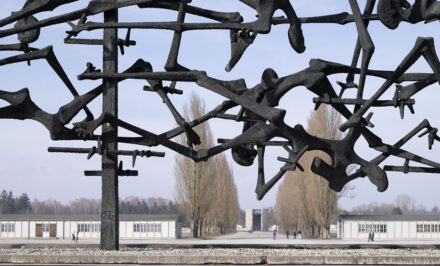![]() Sarah-Leah Pimentel. “The fruitfulness of a seed depends, as we know from experience, on its natural ability to germinate, the quality of the soil and from outward factors – the sun, rain and wind. …What applies to the seed in nature can be applied to the seeds of our spirituality and a universal apostolate. The good earth they need is the natural and supernatural readiness to be generous, but above all, to be chaste and to love. Normally only those who are generous are capable [of living our spirituality]…Chastity is necessary according to the words of our Lord, Jesus Christ, “Blessed are the pure of heart, for they shall see God.” The outward conditions for growth [which our spirituality needs] are all sorts and degrees of difficulties, continual inner and outward battles.” (Joseph Kentenich, 1954/55, Kentenich Reader Vol. II, p. 25)
Sarah-Leah Pimentel. “The fruitfulness of a seed depends, as we know from experience, on its natural ability to germinate, the quality of the soil and from outward factors – the sun, rain and wind. …What applies to the seed in nature can be applied to the seeds of our spirituality and a universal apostolate. The good earth they need is the natural and supernatural readiness to be generous, but above all, to be chaste and to love. Normally only those who are generous are capable [of living our spirituality]…Chastity is necessary according to the words of our Lord, Jesus Christ, “Blessed are the pure of heart, for they shall see God.” The outward conditions for growth [which our spirituality needs] are all sorts and degrees of difficulties, continual inner and outward battles.” (Joseph Kentenich, 1954/55, Kentenich Reader Vol. II, p. 25)
Last week we reflected on how our spirituality is like a seed that has a natural ability to germinate when we are living according to God’s plan for our lives, following the natural rhythms of our unique personalities, character traits, the way we commune with God and relate to others.
Good soil
The second condition a seed needs in order to germinate: the right soil in which to grow. Fr. Kentenich’s language here reminds us of the parable of the sower (Mk 4:1-20). Jesus describes how many seeds were scattered. Some didn’t survive because they landed on rocky ground or were taken by the birds. Some seeds grew very quickly but because they didn’t have a place to set down deep roots, they withered and died. Only the seed that fell in good soil was able to grow. And the seeds that grow, Jesus tells us, are those who “hear the word, accept it and produce a crop.”
Similarly, our spirituality grows best when we are in tune with God’s will and accept ourselves as we are and as God made us. When we try to fit the “mould” of spiritual uniformity, then we are like the seed that fell on rocky ground – we begin to grow but become frustrated with trying to set down roots in an unfriendly soil, and often become discouraged and give up on the exciting journey of discovering who we are in God.
We also need to remember that there is no one definition of good soil. Different kinds of plants require different kinds of soil. A cactus would not grow well in a wetland, and similarly, a rose would never survive in the desert. Each kind of seed needs soil that is suited to it.
Reflection: Which is my good soil?
Spiritual minerals
Irrespective of the kind of soil in which the seed is planted, all soil types contain necessary minerals that are essential for the growth of the plant. So too with us. Fr. Kentenich identifies three minerals that all “good earth” possesses: generosity, chastity, and love.
Generosity – giving what we have and what we don’t have
The soil in which the seed grows best cannot be self-centred or selfish. The seed also cannot grow in isolation. A spirituality that draws strength from itself becomes like the seed that fell in the shallow soil. It shoots up very quickly, possibly sooner than a seed that grows deep roots first. As it shoots up, it becomes proud of its success, its apparent strength. Unable to draw nutrients from the soil, it begins to feed off itself until it withers.
A healthy spirituality, although it is formed in the quiet and hidden parts of the soul, must necessarily be outward focused. When in generosity, we give what we have and what we don’t have, we respond to God’s call to serve our families, community and society. It is a “yes” to the voice of God. It is the Blessed Mother’s fearless “fiat.”
Generosity is the trust that the soil will provide what we need each day for each day. It is the last piece of bread that the widow prepared for the prophet Elijah. God rewarded her faith by making sure she and her son had enough to eat till the famine ended (1Kings 17:7-15). When we respond generously, Jesus promises us that our well will never run dry. When we become a blessing for others, we are blessed in return.
Reflection: What are the limits of my generosity? What practical step can I take to become more generous with my time and my resources?
Love simply gives
Love is also necessary for healthy spiritual growth. Plants grow well when the gardener tends them lovingly. We need only look at children who come from loving homes to see that they grow to be whole, healthy, joyful adults. In contrast, children who are surrounded by insecurity, fear, conflict and distrust find it much harder to enter into meaningful relationships. They do not know what it means to love and be loved.
Spiritual seeds grow best in a soil that contains the life-giving power of love. Love is a response to generosity, but it is also a catalyst for generosity. Love is the ability to look at the other and forget the selfish desires of the self. Love simply gives. It asks for nothing in return. It is an expression of God’s unconditional love for us. If the young seed is fed with love, it reciprocates this unconditional love. Our response in love allows us to grow and like the strawberry plant, it propagates in every direction. It is the love of Jesus that comes to life in today’s world when we love another.
Jesus summed up all the commands saying that “there is no other commandment greater than these: “Love the Lord your God with all your heart and with all your soul and with all your mind and with all your strength.” (Mark 12:30-31)
The family is the first place where we are called to give unconditional love – even to those who have not been able to love us perfectly. It is also to love the stranger and the outcast who cries out for help and has no way of paying us back for our deeds of love. We simply love: because we are, because they are.
Reflection: Who are the people in my family and workplace who are difficult to love? How can I make more of an effort to love them unconditionally, even if I don’t always like them? How can I reach out in love to the marginalized in my community, expressing my love for them by means of practical help?
Chastity – the treasure of a sound mind and sound body
Fr. Kentenich says that chastity is another essential mineral in good soil. The reader might say, hold on, Fr. Kentenich was speaking to a group of priests. Yes he was. But chastity doesn’t apply only to priests and those in the consecrated life. Chastity has an important place in every Christian life. Chastity means “purity in conduct and intention,” “restraint” and one dictionary even adds “personal integrity” as one of the definitions of chastity.
In a society that places so much importance on satisfying pleasures of every kind – food, money, sex – and in a culture that tells us that we deserve everything we desire, chastity is also a precious metal.
Chastity is the ability to say no. Not everything I desire is good for me. Chastity is the self-discipline of being able to control our fantasies, to rein in our desires and acknowledge that others – spouse, children, employees – are not there merely to satisfy our immediate needs for sexual pleasure, to fulfil our shattered dreams or to feed our sense of self-importance.
Chastity is a fruit of the Holy Spirit that allows us to remain pure in all things, in our thoughts and words. Chastity is the treasure of a sound mind and a sound body. In the soil of chastity, our spirituality flourishes because it is no longer bound by selfish desires and passions. Instead, it’s oriented upwards towards God and outwards towards others.
Reflection: Which areas of my life call me to practice chastity? How can self-restraint help me on my spiritual journey?
The good soil of community
Good soil generates new life, both for the seed as well as for every other organism that lives in the earth and draws its existence from the symbiotic relationships among these different organisms. The soil, becomes a kind of community. The seed of spirituality only grows well in a community with others, preferably a community in which each member gives and takes in equal measure so that all can grow to full strength, each in their own time.
Prayer:
Dear Jesus, as we journey with you into the second week of Lent, we want to become more like you. We want to follow your example of complete generosity and love. The world we live in tells us to take whatever we want and it becomes very difficult not to succumb. Give us the strength to practice self-restraint and we offer our sacrifices to you as a gift of love for the unconditional love you showed us from the Cross. Amen.













